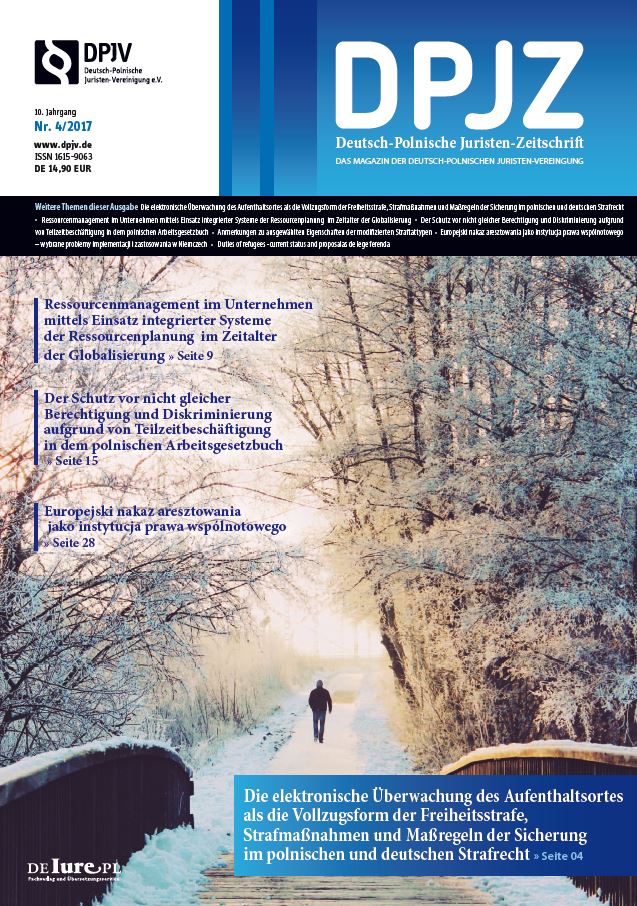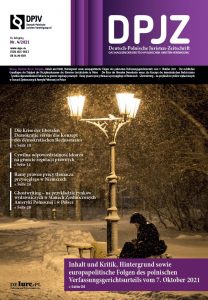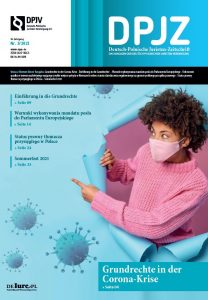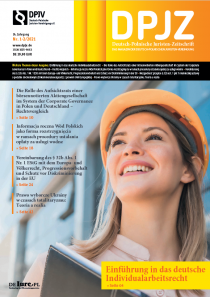Inhaltsverzeichnis:
- „Die elektronische Überwachung des Aufenthaltsortes als die Vollzugsform der Freiheitsstrafe, Strafmaßnahmen und Maßregeln der Sicherung im polnischen und deutschen Strafrecht“ von Piotr Góralski
- „Ressourcenmanagement im Unternehmen mittels Einsatz integrierter Systeme der Ressourcenplanung im Zeitalter der Globalisierung“ von Katarzyna Witczyńska
- „Der Schutz vor nicht gleicher Berechtigung und Diskriminierung aufgrund von Teilzeitbeschäftigung in dem polnischen Arbeitsgesetzbuch“ von Helena Szewczyk
- „Anmerkungen zu ausgewählten Eigenschaften der modifizierten Straftattypen“ von Joanna Brzezińska
- „Europejski nakaz aresztowania jako instytucja prawa wspólnotowego – wybrane problemy implementacji i zastosowania w Niemczech“ von Paweł Arkadiusz Krajewski
- „Duties of refugees -current status and proposalas de lege ferenda“ von Marta Pietras-Eichberger
Streszczenia / Summaries
Dr. Piotr Góralski
Die elektronische Überwachung des Aufenthaltsortes als die Vollzugsform der Freiheitsstrafe, Strafmaßnahmen und Maßregeln der Sicherung im polnischen und deutschen Strafrecht. Teil 2
Zusammenfassung: Im zweiten Teil des Artikels wird eine allgemeine Charakteristik der polnischen Strafregelungen, die sich auf die elektronische Überwachung beziehen, dargestellt. In diesem Teil der Überlegungen werden polnische Regelungen besprochen, welche in den Jahren 2007-2016 entstanden sind und verschiedene Formen der elektronischen Kontrolle des Aufenthaltsortes betreffen. Es geht hier hauptsächlich um geltende Vorschriften des Strafgesetzbuches und des Strafvollzugsgesetzbuches, die drei Formen der Aufsicht über Verbrecher enthalten, d.h. die stationäre Aufsicht, die auf die Kontaktversuche konzentrierte Aufsicht und die mobile Aufsicht. Im Folgenden werden Argumente genannt, welche die Notwendigkeit der Anwendung von einzelnen Arten der elektronischen Kontrolle des Aufenthaltsortes begründen sowie Meinungen gegen die Einführung dieser Institution in die Strafrechtsvorschriften bzw. gegen ihre Anwendung gegenüber bestimmten Kategorien von Verbrechern.
Schlüsselwörter: elektronische Überwachung, elektronische Kontrolle des Aufenthaltsortes, „elektronische Fußfessel“, elektronischer Hausarrest, Maßregeln der Sicherung und Besserung.
Summary: In the second part of the article, general characteristics of Polish criminal regulations concerning electronic supervision were presented. In this part, Polish regulations regarding various forms of electronic monitoring of the place of residence introduced in 2007–2016 were discussed. This refers mostly to the applicable regulations of the Polish Penal Code and Polish Executive Penal Code, which include three forms of offenders’ electronic monitoring, i.e. curfew monitoring (translator’s note: dozór stacjonarny), restraint order-related monitoring (translator’s note: dozór zbliżeniowy) and general monitoring (translator’s note: dozór mobilny). Further, arguments for the use of particular forms of electronic monitoring of the place of residence and arguments against including electronic tagging in provisions of criminal law, or at least against using it towards certain categories of offenders were presented.
Key words: electronic supervision, electronic monitoring of the place of residence, electronic handcuffs, electronic home detention, preventive measures
Über den Autor: Dr. Piotr Góralski ist Adjunkt am Lehrstuhl für Materielles Strafrecht an der Fakultät für Rechts-, Verwaltungs- und Wirtschaftswissenschaften der Universität Wrocław. Er befasst sich unter anderem mit der Problematik der Gründe der strafrechtlichen Haftung, der Grundsätze des Strafmaßes (insbesondere der Maßregeln der Sicherung ) und auch der rechtlichen Aspekte der euthanatischen Kriminalität. E-mail: piotr.goralski@uwr.edu.pl.
- Katarzyna Witczyńska
Ressourcenmanagement im Unternehmen mittels Einsatz integrierter Systeme der Ressourcenplanung im Zeitalter der Globalisierung
Zusammenfassung: Der Einsatz moderner IT-Lösungen zur Optimierung des Unternehmensmanagements ist Grundlage unternehmerischen Erfolges. Ein Beispiel dieser Art von Technologien ist das integrierte IT-System aus dem Bereich ERP. Die Abkürzung ERP kommt aus dem Englischen und bedeutet Enterprise-Resource-Planning, d.h. die Ressourcenplanung des Unternehmens. Im vorliegenden Artikel werden die Möglichkeiten behandelt, derartige Strategien in polnischen Unternehmen zu nutzen.
Schlüsselwörter: Strategien des integrierten Managements, Globalisierung
Summary: The use of modern IT solutions to optimize company management is the basis for entrepreneurial success. One example of this type of technology is the integrated IT system from the area of ERP. The abbreviation ERP comes from English and means enterprise resource planning, i. the company’s resource planning. This article discusses the possibilities of using such strategies in Polish companies.
Keywords: integrated management strategies, globalization.
Über die Autorin: Email: katarzyna.witczynska@uwr.edu.pl
3. Helena Szewczyk
Der Schutz vor nicht gleicher Berechtigung und Diskriminierung aufgrund von Teilzeitbeschäftigung in dem polnischen Arbeitsgesetzbuch
Zusammenfassung: Ein wichtiges Element dieses Schutzes ist auch das Diskriminierungsverbot aus Art. 292 § 1 des Arbeitsgesetzbuches. Große Bedeutung weckt auch § 2 dieser Vorschrift, wo die Arbeitgeberpflicht der Erwägung des Antrags des Arbeitnehmers auf Änderung der Arbeitszeit geregelt ist. Danach soll der Arbeitgeber, wenn dies objektiv möglich ist, den Antrag des Arbeitgebers berücksichtigen.
Diese Vorschrift korrespondiert mit dem Art. 942 des Arbeitsgesetzbuches, im Lichte dessen die Arbeitgeber verpflichtet sind, die Arbeitnehmer auf die beim jeweiligen Arbeitnehmer übliche Weise über die Möglichkeit der Voll- oder Teilzeitbeschäftigung zu informieren. Eine solche Lösung stimmt mit dem Recht der Europäischen Union völlig überein.
Schlüsselwörter: Arbeitgeber, Arbeitnehmer, Arbeitrecht, Diskrimieniung
Summary: Legitimacy of the existing of legal regulations concerning the protection against unequal treatment and discrimination in employment does not raise doubts in the Polish law. While the question about the purposefulness of separation in the Polish Labour Code of the “employment in full-and part-time work” is still open as one of the most important criteria for discrimination of employees. Polish legislator has used in this case the contained in the Polish law possibility of adopting higher standards than set out in EU law. As a consequence, the protection against unequal treatment and non-discrimination due to discussed criterion the anti-discrimination solution are applied included in the Polish Labour Code. In addition, this principle has exceptions, in the light of which it is possible to differentiate employees because of the discussed criterion, if only it is justified by objective grounds or the application of the principle of proportionality.
An important element of this protection is also a prohibition on discrimination contained in Art. 292 § 1 of the Labour Code Of great importance is also § 2 of this provision, which sets the employer’s obligation to consider the employee’s request to amend the working time, and then when it is objectively possible, the employer has a duty to take into account the employee’s request.
This provision corresponds to Art. 942 of the Labour Code, under which employers are obliged to inform employees in a manner adopted by a given employer, about opportunities of employment in a full or part-time work. This solution is fully compatible with European Union law.
Keywords: Labour Code, Employeer, Labour Law, Diskrimination
Über die Autorin: Kattowitz, Schlesien Universitat, Juristische Fakultat, E-Mail: hszewczyk@o2.pl
- Joanna Brzezińska
Anmerkungen zu ausgewählten Eigenschaften der modifizierten Straftattypen
Zusammenfassung: Der Dynamismus der modifizierten Typen wird durch die fortgeschrittene Veränderbarkeit der Faktorenkonstellation, sowohl formeller, als auch materieller Natur, zum Ausdruck gebracht. Er äußert sich nämlich in der Umwandlung ihrer Konstruktion gegenüber dem Haupttyp durch eine Änderung der Tatbestände der Letzteren. Außerdem lässt sich eine materielle Komponente aufzeigen, die anders als beim Haupttyp ist, und die die Form des Niveaus des Sozialschädlichkeitsgehalts in den einzelnen modifizierten Varianten hat.
Schlüsselwörter: Modifizierte Typen der Straftaten, Dynamik, Straftaten.
Summary: The purpose of this study was to indicate selected properties of modified types of crimes (privileged as well as qualified). The most important was the dynamism of indicated types. Considerations concerning directions of interpretations of this term have been undertaken, indicating that in relation to the modified types it can take the form of formal approach (through the extension of hallmarks system or application of general clauses) as well as material approach (through the differentiation of intensity of the social noxiousness as material feature of crime). It was thus shown that the dynamism of the types of crime described preserves a complex nature.
Keywords: Modified types of crimes, Dynamism of the types of crime
Über die Autorin: Dr. Joanna Brzezińska ist Adjunkt am Lehrstuhl für materielles Strafrecht an der Fakultät für Rechts, Verwaltungs- und Wirtschaftswissenschaften der Universität Wroclaw, E-Mail: joanna.brzezinska@uwr.edu.pl
- Marta Pietras-Eichberger
Duties of refugees -current status and proposalas de lege ferenda
Summary: In international public law a lot of attention is paid to the status of refugees and their rights, which are entitled to the migrants who need international protection due to humanitarian reasons. Yet, there are no publications, even on a piecemeal basis, in which apart from rights there would be the indication of obligations. Undoubtedly, this gap results from a lack of legal acts which would unequivocally and in a complex way establish refugees’ obligations. That is why in the present publication an attempt has been made to create a catalogue of obligations for migrants-refugees seeking them in biding acts as well as in acts which serve the need of political accords at the international and national levels.
The publication titled ‘Duties of refugees -current status and proposals de lege ferenda’ consists of six subtitles: Introductory remarks, Contemporary refugees, The analysis of refugees’ obligations in the current state of law and in the present political situation, The obligation to integrate or the right to integrate, Duties of refugees-proposals de lege ferenda and Final remarks.
In the article there are used fallowing research methods: the legal-comparative method, the historical method and the analysis of documents within the scope of international law.
Key words: Migrants, refugees, human rights, migrants’ obligations, duties of refugees, unauthorised economic migration, Islamophobia, the migrant crisis in the EU, integration of immigrants, integration, assimilation, the host society, cultural distinctiveness.
Über die Autorin: Dr Marta Pietras- Eichberger – Dr nauk prawnych, adiunkt w Zakładzie Prawa Międzynarodowego, Stosunków Międzynarodowych i Europeistyki, Katedra Prawa Konstytucyjnego i Stosunków Międzynarodowych, WSPiA Rzeszowska Szkoła Wyższa. Autorka ponad 20 publikacji z zakresu prawa międzynarodowego, prawa człowieka i prawa UE. Członek Stowarzyszenia Prawa Międzynarodowego -Grupa Polska, a także European Society of International Law (ESIL). WSPiA Rzeszowska Szkoła Wyższa (WSPiA University of Rzeszow)



